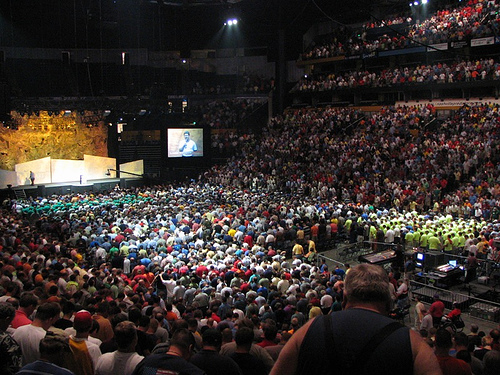“Today, for the first time in history, we can accurately map and measure person-to-person interaction. Our online social networks connect millions of people and support communication between these people. We can measure who is connected to whom, who talks to whom and who share ideas with whom.”–Jeff Hurt
Traditional outreaches involve lots of front-end promotion, a large in person gathering, an emotional appeal, minimal follow-up, and metrics around an intellectual response (a decision of some sort).
Social media provides a new opportunity to measure the sentiment of the audience before, during, and after the event, as well as track the action behavior that resulted from participating in the event.
Many ministry leaders intuitively sensed that these events involved a lot of effort and often lead to minimal long-term results, but now social media reveals exactly whether a decision resulted in any life-change.
Drawing a crowd and mobilizing people towards significant life change are not as interconnected as once thought. The data coming out of social networks such as Facebook reveal that most people are connecting with a few close friends even though they may have a large network, and are influenced more by the choices of these friends than the words of a speaker.
“Successful organizations of the future will move toward an understanding of how groups of friends talk about their brand, products and services.”–Jeff Hurt
Successful outreaches in the future (or present) will focus their resources on influencing and mobilizing small groups of friends with content that they are already interested in and are talking about, instead of using resources to push people towards content that is unfamiliar. By successful I mean long-term life change, not a high energy, large group, event.
Any ministry would do well to use social media to evaluate whether there is evidence of the life-change and mission that is being talked about. If people are participating in activities but posting pictures of themselves living a worldly life-style then there might be a gap worth addressing.


Fascinating stuff. I especially resonate with the shift from creating events / campaigns and then inviting Christian students to mobilize their networks to participate vs. mobilizing Christian students to engage their existing networks with their own experience.
We’ve seen a hint of the power of mobilizing those networks in Canada through helping students engage their social networks with the MyStory training, through which hundreds of students are deploying their personal stories of transformation through their social networks.
Thanks for the examples Andy–the more of those that we can share with each other the sooner we can change the culture and tap into these powerful small networks more strategically!
Brian, the things you are explaining are the very reason we have in our movement moved away from more big-group outreaches and focused more on relationships with friends FIRST, and events that they bring friends to second. Thanks for posting.
Agreed. I sensed this 10 years ago, but could never explain why. Love that social media is illuminating these differences so clearly.
Good stuff Brian. Tapping into small networks, of audiences not already in our circle, for ministry purposes is a growing trend. The more we understand what each group needs and what it takes to be trusted agents of influence in those groups, the more effective we will be for the gospel. That’s a lot of specialized work that will take a new breed of worker.
I do still think there’s room for the big event, especially the multi-city, coordinated live events being facilitated by technology, i.e. Kirk Cameron’s “Monumental” http://www.monumentalmovie.com; Greg Laurie’s “Crusade America” http://harvestamerica.com.
Optimally, the two shall meet. That is, the big event designed for personalized and ongoing follow-up.
I too think large events have a place–it’s just what they promise versus what they deliver are often too different things.
So often the large events that were pitched to me when I was head of a ministry were about building up my ministry with lots of new believers–but that did not happen. My students experienced new opportunities to share their faith, more people on campus heard about our ministry, and some really good buzz was created.
I think those kinds of things need to be shared with the host ministry in order to meaningfully build into both the host and the speaker/campaign coming in.